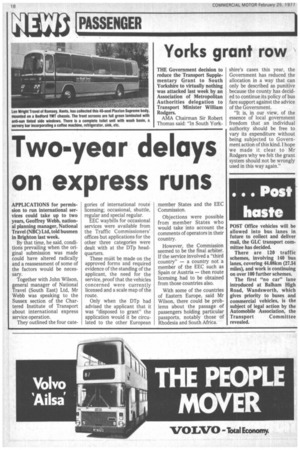Two-year delays • on express runs
Page 22

If you've noticed an error in this article please click here to report it so we can fix it.
APPLICATIONS for permission to run international services could take up to two years, Geoffrey Webb, national planning manager, National Travel (NBC) Ltd, told busmen in Brighton last week.
By that time, he said, conditions prevailing when the original submission was made could have altered radically and a reassessment of some of the factors would be necessary.
Together with John Wilson, general manager of National Travel (South East) Ltd, Mr Webb was speaking to the Sussex section of the Chartered Institute of Transport about international express service operation.
They outlined the four cate gories of international route licensing; occasional, shuttle, regular and special regular.
EEC waybills for occasional services were available from the Traffic Commissioners' offices but applications for the other three categories were dealt with at the DTp headquarters.
These must be made on the approved forms and required evidence of the standing of the applicant, the need for the service, proof that the vehicles concerned were currently licensed and a scale map of the route.
Only when the DTp had advised the applicant that it was "disposed to grant" the application would it be circulated to the other European member States and the EEC Cornmission.
Objections were possible from member States who would take into account the comments of operators in their country.
However, the Commission seemed to be the final arbiter. If the service involved a "third country" — a country not a member of the EEC such as Spain or Austria — then route licensing had to be obtained from those countries also.
With some of the countries of Eastern Europe, said Mr Wilson, there could be problems about the passage of passengers holding particular passports, notably those of Rhodesia and South Africa.






























































































